After spending the last few days hovering between $580-610, ETH looks to be dropping this morning.
Last week I thought we would see a quick recovery this weekend. Oops. It appears this latest “bear cycle” is legitimate.
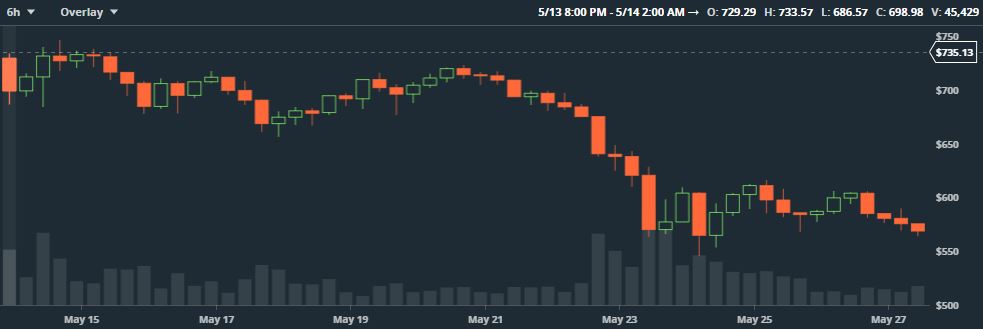
I was wrong about last week. I thought ETH was clear towards a big summer. That said, I’m still incredibly bullish for the next few months.
Short-term Price Prediction
I think we see a bit more downward movement this upcoming work week – mid $500s, testing $500 potentially – before a sharp recovery starts June 1st / 2nd. (Friday/Saturday)
I feel really strongly about this. My gut says June is a huge month and good times are near.
Don’t believe me? Bro, I’m from the internet.
Need triangles? /u/OperationNine has you covered:
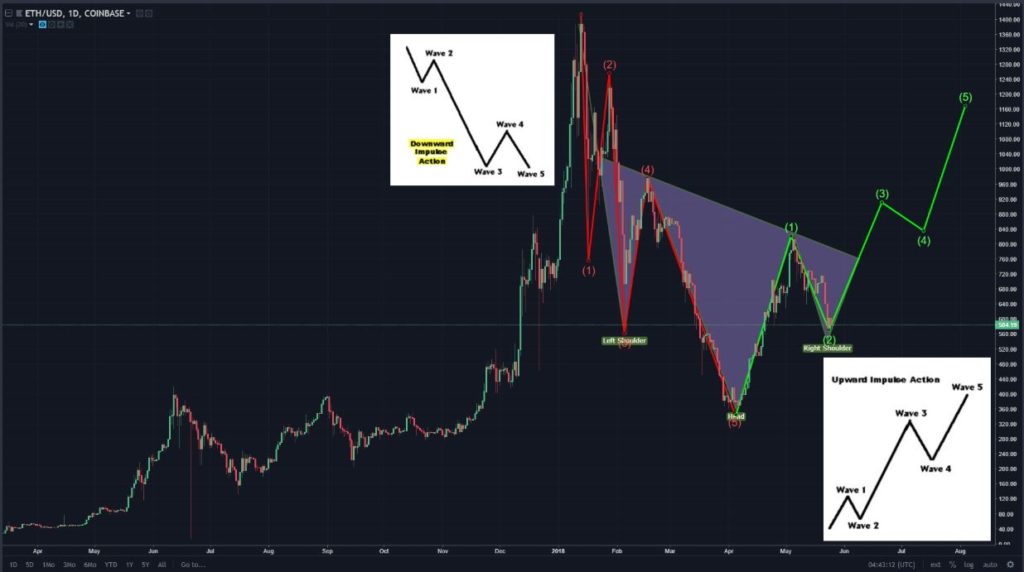
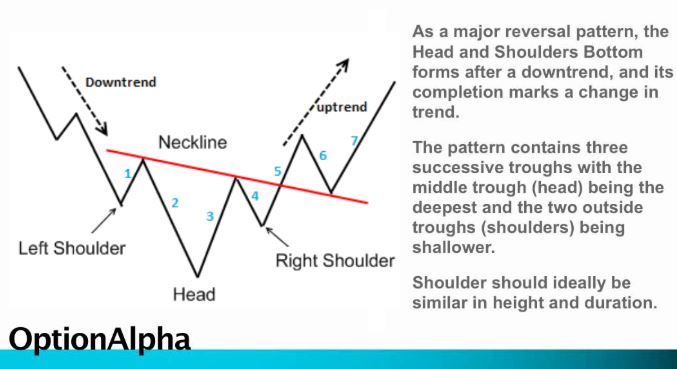
None of this really matters though…
This is just stupid price speculation in a highly volatile, manipulated market.
What matters is the ridiculous potential of a ‘decentralized world supercomputer’ – which is what Ethereum is.
For me it’s clear that new decentralized supercomputers like Ethereum are about to fuck up all types of business models. This is why I left my job, I need a front-row seat at the carnage.
Decentralized Supercomputers are Game Changing
Ethereum is essentially an extremely powerful super computer composed of different individual computers from around the world.
In the future, companies will be able to leverage the combined computing power of the Ethereum network to do computer-intensive tasks.
Right now companies pay millions to Amazon, IBM, and other centralized computing farms for “heavy compute” tasks, for example mapping the human genome.
Currently there is a serious shortage in computing power. At the same time there are tons of unused computers now all over the world doing nothing. What if those could be tapped into? And monetized by their owners?
Think about when everybody is at work – most people have a home computer / laptop that is sitting idle. In the future – if individual users are “paid” to contribute computing power – people will have their computers “working” for them while they’re at their job.
A network like Ethereum – and projects being built on it like Golem, SONM, and iExec (and soon Hypernet) – is aiming to do just this.
Improving the “Sharing Economy”
In a way it’s very much like ‘AirBnB.’ There was demand for affordable places to stay while traveling + a supply of unoccupied apartments.
AirBnB facilitated this type of new “sharing economy”
But I take major fault with the concept that this is truly the “sharing economy” (h/t Brenden Eich)
These are “centralized matching services” that take a signficiant premium for people using their services. In Web 2.0 this makes sense as these companies provide value in security/protection/insurance.
While AirBnB and Uber have disrupted hospitality and the taxi industry – they are about to be disrupted themselves!
In the future, decentralized versions of these companies will exist, and their model will take SIGNIFICANTLY LOWER fees than a centralized service like AirBnB.
This is the true future of the “sharing economy” – one where the value is better retained between buyer and supplier. Death to the middlemen.
[By the way, this is currently being built, the most promising one to me is BeeToken – ex-Uber/Facebook/Google people behind this. Overall it’s a great sign when you see people from the best Web 2.0 companies leaving to build their own Web 3.0 projects.]
Building a Better Internet (Web 3.0)
As I’ve said before, A new internet is being built. This is not just a Silicon Valley TV show joke.
This is real, and it’s amazing. And right now Ethereum is leading the way.
What excited me most about this “new internet” was how much it improves upon the current one, which has some major flaws.
This is a core argument for the majority of new websites/applications being built on Ethereum. Joe Lubin, founder of Consensys and co-founder of Ethereum, agrees:
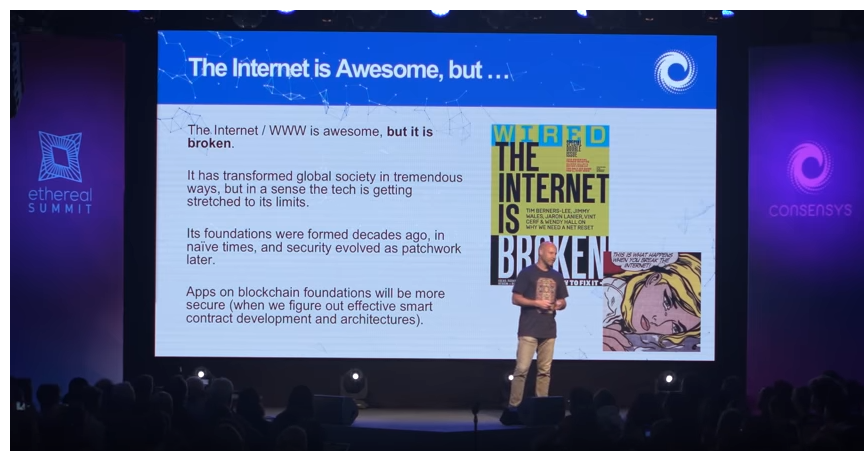
Some of the flaws in Web 2.0 have been haunting me for over a decade.
I’ve always been concerned around the lack of user privacy, lack of user controlled data central to the model of the current Web 2.0.
In 2008 I wrote something called ‘The Universal Social Network’ that called out Facebook’s issues around this, in context of why ‘Facebook’ wouldn’t become the ‘Universal Social Network’:
User privacy concerns / Default privacy settings
Facebook has shown many times in its short history that it isn’t afraid to infringe on its users privacy. Although Facebook claims that user privacy is one of their main principles, Facebook’s privacy controls continue to be inadequate and its default settings are irresponsible.
Facebook’s default settings are always set to expose as much information as possible, as opposed to letting users decide for themselves how they want their information used on Facebook. When Facebook releases a new feature, users need to “opt-out” if they don’t like it, rather than include themselves because they want to try it.
In the Facebook TOS they own all user generated content on the site, which doesn’t have to be the case. Facebook is the owner of our photographs, messages, anything we create on the site.
Facebook ended up creating a big mess
I’ve pretty much had a vendetta against Facebook for over 10 years because of their brazen disregard for user privacy.
I even registered the domain ‘stopfacebook.com’ in 2007!
Watching Facebook “get rekt” over the past year has been a little cathartic but ultimately that’s just self-serving. I did nothing to stop what it became. Which was a monster.
When I started learning about Blockchain technology I didn’t get it at first. Conceptually it’s confusing. I started learning about Bitcoin – digital money – but then I discovered what other kinds of use cases the technology enables.
It’s clear that blockchain is the ultimate technology to enable the types of platforms I was imagining a decade ago. And I’m not the only one who thinks this way.
As I type this a better internet is being built. One where the user is back in control.
Moving from Web 2.0 -> Web 3.0
As I mentioned earlier, we are currently living in Web 2.0. And in this ecosystem Users are the product.
It’s our private data, our information that companies like Facebook are using to monetize, often with deceptive collection methods.
During Blockchain Week I heard the phrase ‘Surveillance Capitalism” used a few times. That term basically sums it up.

Web 3.0 will be different!
Because of the new functionality of “trusted transactions” and “automated agreements” there can be significant disintermediation into current business models.
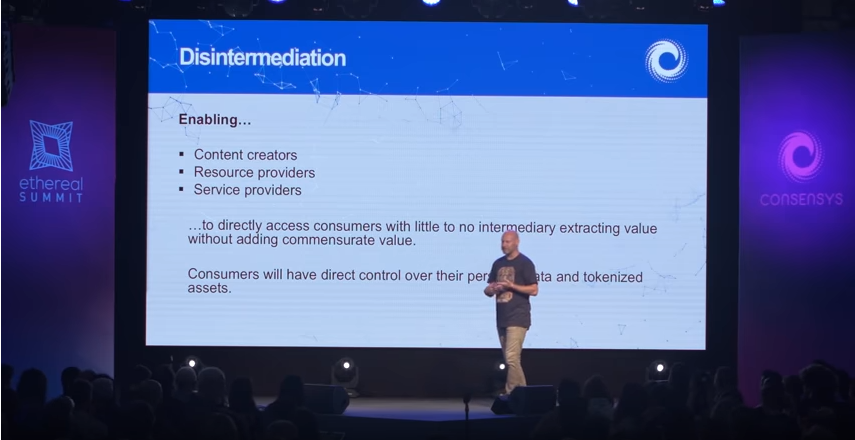
This has huge ramifications for how the internet will evolve.
Certain Markets are Begging for Disruption
Online advertising is a great example.
Currently so much value is lost to middleman in the online advertising industry that it puts major pains on both Advertisers and Publishers. (and as mentioned earlier the users are treated like crap)
Projects like Brave Browser and Basic Attention Token aim to completely change how internet advertising works by creating a more efficient marketplace.
In the Brave/Basic Attention Token vision – the middlemen are removed and the value is better distributed among the 3 parties:
In this model, because of disintermediation, there is enough reclaimed value that the User can actually be compensated.
Users – instead of being taken advantage of – now can use a privacy-based system where they can enable ads and actually get paid to be exposed to them!
This is just one example. A more ‘X-rated’ use-case is the adult webcam industry. This is an industry where the centralized websites that take a massive % of revenue from it’s contractors. A blockchain based decentralized infrastructure has the potential to massively change that. Performers who have been forced to accept losing 50% of their tips will see things improve by an order of magnitude (~5%). [SpankChain, launching in June]
Another example is gambling. Right now centralized gambling sites take a 10% premium on bets. In the near future decentralized gambling will massively reduce that % – endangering the business models of the current centralized industry leaders. [Augur, launching July 9th; FunFair launching in June]
I can’t understate how massive decentralized gambling is going to be.
When tech advancements – the internet being a great example – it’s usually the gambling/porn industries that are first to innovate.
The dAppening is Coming
These new ‘websites / projects’ – which were never possible before the invention of blockchain technology and smart contracts – are called ‘dApps’ (decentralized applications)
Some of these dApps have been in development for years – Augur for example – and now they are finally about ready to launch.
These early dApps are really experiments – first versions of their concepts that very well may fail or break. That excites me about the whole space. Building things that have never been done before.
That said, there are already some very interesting dApps already live on the Ethereum mainnet. My next post will explain how those work, and how you can start experimenting yourself with the Ethereum blockchain.
To sum it up, the dAppening is coming (when mass audience starts interacting with a dApp) and faster than people think.
Ethereum – a Playground for Nerds
Right now interacting with the ETH blockchain is kinda like a nerd fantasy world. It’s an incredibly small community – which I think is both good and bad.
Good in that the userbase is incredibly passionate. Also with ETH’s current scaling limitations it can only handle so many users.
Bad in that our community is sooo small and insular. We NEED people from the outside to be learning about this and helping.
Currently, we – the early adopters – use our own browser (or browser extension) that allows us to interact with the Ethereum blockchain. We’re experimenting with the protocol in different ways – like playing games, rendering video files for profit, creating a CDP (Collateralized Debt Position), and much more. It’s really cool stuff.
Over the next few months users will be able to start gambling. That is when shit is going to really start getting real. I think it coincides with a big price move.
How does ETH become Mainstream?
Currently interacting with the Ethereum blockchain is still too complicated for the masses. But that’s OK for now.
Companies like Consensys are building the tools that will facilitate mass user adoption. Every day the experience is being improved upon.
The key is building applications that are seamless and naturally integrated. It won’t feel like you are “using” the blockchain. It will just feel like another app.
We aren’t close to that point yet – in fact we’re still years away. But I can’t wait to follow the progress and contribute myself.
These are exciting times. The price doesn’t really matter. The technology does. The price will eventually reflect the value of the technology.
This summer is going to be huge. For adoption and for the price of ETH.
I leave you with an interesting CNBC segment from Fast Money on Friday. I don’t agree with everything the person being interviewed says, but it’s interesting: (especially the very end)
Times are changing. The Herd is Coming™. Crypto isn’t going anywhere.
Weak hands get rekt.